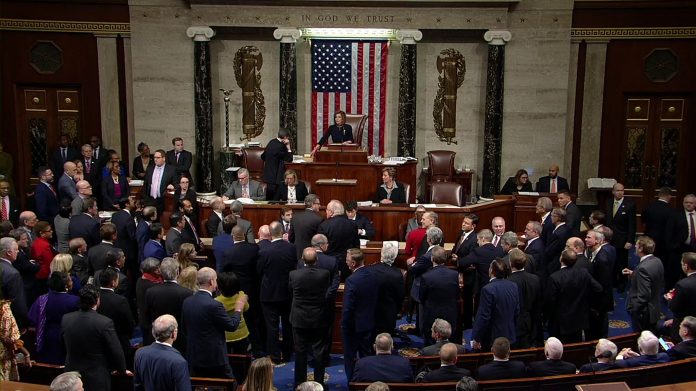The possibility of impeachment has loomed over the Trump presidency since its earliest days. Since before taking office, both Trump’s nefarious relationship with the Kremlin as well as his constant efforts to enrich himself and his family through the presidency was fodder for discussions of impeachment. From the time these questions were raised, apologists for the President, as well as many who were critical of Trump but less cognizant of the damage that had already been done to American democracy, have argued that impeachment was a bad idea because the voters should be the ones to judge the President. As the election of 2020 got closer, this view was expressed even more strongly by many who reminded us how soon the voters would have their chance to determine Donald Trump’s fate. In doing that they repeated the same disingenuous reasoning, such as it was, that led Mitch McConnell and his Republican followers to abdicate their Constitutional duty on the matter of Merrick Garland’s nomination to the Supreme Court in 2016.
The idea of waiting for the voters to decide whether or not Donald Trump should be removed from office is appealing in its simplicity and because it appeals to what seem like first principle understandings of democracy, but it is nonetheless wrong. The most glaring reason the notion that the people should decide is that, as Adam Schiff has pointed, the actions for which Trump was impeached sought to undermine the integrity of our elections. Letting the fate of a candidate who benefited from foreign involvement in his first election and was seeking more foreign intervention for his reelection bid be decided at the polls is not just nonsensical, but it all but encourages him to continue seeking help from foreign powers.
There is also no mechanism in the US for letting the people decide. Presidents not elected by the American people in a system of one person one vote. Rather, they are elected by an electoral college which gives significant additional weight to the votes of rural white Americans. This is the same undemocratic quirk of the American Constitution that will lead to Trump’s acquittal in the Senate. Republicans won a minority of votes in each of the last three Senate elections and represent states with a minority of the American population. The same math that delivered Mitch McConnell the Senate majority, and Donald Trump the presidency, could well keep Trump in office for another four years. There is nothing that can be done about that between now and November, but we should not mistake that for democratic accountability in any meaningful sense.
Apologists for the President, as well as many who were critical of Trump but less cognizant of the damage that had already been done to American democracy, have argued that impeachment was a bad idea because the voters should be the ones to judge the President
Another reason why impeachment and removal is the better way to hold the Trump accountable is that it upholds the core principle of rule of law. The founders envisioned a system where a president who consistently abuses his power, obstructs justice and conflates his personal political and financial goals with the national interest, would not be able to remain in office. This is at the core of the idea that no one person is above the law. If that idea is not upheld than democracy will wither. The last three years have demonstrated that relatively unambiguously. On the other hand, if instead of enforcing rule of law we simply wait for the voters to decide, we are sending a message that presidents can do whatever they want as long as enough voters don’t mind. This is a very different model of governance than either what the founders envisioned or what is generally understood as democracy. It is particularly troubling when apologists for the president suggest they are continuing to support him because to do otherwise would further divide the country. This dangerous cowardice is the opposite of leadership and sacrifices rule of law at the altar of an imagined national unity-national unity that Trump and the Republicans have worked hard to preclude, or destroy, -over the course of the last few years.
The strength of the Constitution is that while the government is elected, albeit not precisely through democratic processes, they are also supposed to be held accountable both by the law and by the other branches of government. By acquitting the president and implicitly leaving the questions of Donald Trump’s fitness to remain in office, despite the clear evidence of his wrongdoing, to the voters, as the Senate has done, they have abandoned this valuable principle. In doing so, they have moved the US away from democracy and towards being some form of electoral authoritarianism where if you win an election you can do whatever you want. That has been Donald Trump’s operating belief since he took office. The Republican led US Senate is now formally ratifying that radically different and dangerous vision of the US political system.
www.lincolnmitchell.com
Follow me on Twitter at http://twitter.com/LincolnMitchell

